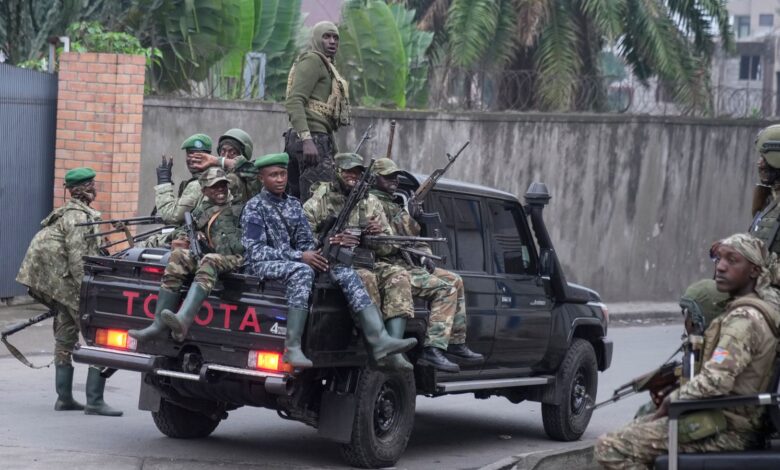Bodies in streets as morgues exceed capacity after 700 killed in just four days of fighting around Goma in Congo | World News

More than 700 people have been killed in fighting in the Democratic Republic of Congo this week, the UN has said.
The Congolese health ministry said on Saturday there were 773 bodies in hospital morgues in and around Goma following a recent offensive by rebels who seized the eastern city.
More bodies were lying in the street after morgues in the area exceeded their capacity, the ministry added.
The UN shared similar figures and added that around 2,800 people are thought to have been injured in the Goma area between 26 and 30 January.
Congo has been wracked by fighting between the Rwandan-backed rebels and government forces.
Recently, M23 rebels took control of Goma – east Congo’s largest city and the capital of the North Kivu province, which is home to lucrative gold, coltan and tin mines.
After taking the city, the Tutsi-led rebels were said to be moving toward Bukavu, in South Kivu, but appeared held up on Friday by Congolese troops supported by Burundi’s army.
Read more on Congo crisis:
Eyewitness: Fears in Goma after rebel advance
Explained: Why is there fighting and is Rwanda invading?
Well-trained and professionally armed, M23 is the latest in a long line of Rwandan-supported rebel movements to emerge in Congo’s volatile eastern borderlands following two successive wars stemming from Rwanda’s 1994 genocide.
It is the most potent of more than 100 armed groups vying for control of the eastern region.
The central African nation’s military was weakened after it lost hundreds of troops and mercenaries in the fall of Goma.
But Congo’s military recently recaptured the villages of Sanzi, Muganzo and Mukwidja in South Kivu’s Kalehe territory, which had fallen to the rebels earlier this week, according to two civil society officials.
UN peacekeeping chief Jean-Pierre Lacroix said the M23 and Rwandan forces were around 37 miles (60km) north of South Kivu’s provincial capital of Bukavu, having covered almost the same distance in the previous two days.
Mr Lacroix said the rebels “seem to be moving quite fast,” and had the chance to capture an airport a few kilometres away which “would be another really significant step.”
The seizure of Goma also resulted in a humanitarian crisis, the UN said.
It had served as a humanitarian hub and was vital for many of the six million people displaced by the conflict.
Rose Tchwenko, country director for the Mercy Corps aid group in Congo, said the capture had led to “a standstill, cutting off a vital lifeline for aid delivery across eastern Congo”.
She added: “The escalation of violence toward Bukavu raises fears of even greater displacement, while the breakdown of humanitarian access is leaving entire communities stranded without support.”
The rebels have vowed to march all the way to Congo’s capital Kinshasa, 1,000 miles (1,600km) to the west.
The rebel advance has been marked by “summary executions of at least 12 people” by the M23 group, UN human rights office spokesman Jeremy Laurence said on Friday, adding the group has also occupied schools and hospitals and subjected civilians to conscription and forced labour.
On the other side, Congolese forces have been accused of sexual violence in the region, Mr Laurence added.
He said the UN was verifying reports that Congolese troops raped 52 women in South Kivu.
https://e3.365dm.com/25/02/1600×900/skynews-dcr-congo-goma-m23_6816495.jpg?20250201154639
2025-02-01 15:02:00












